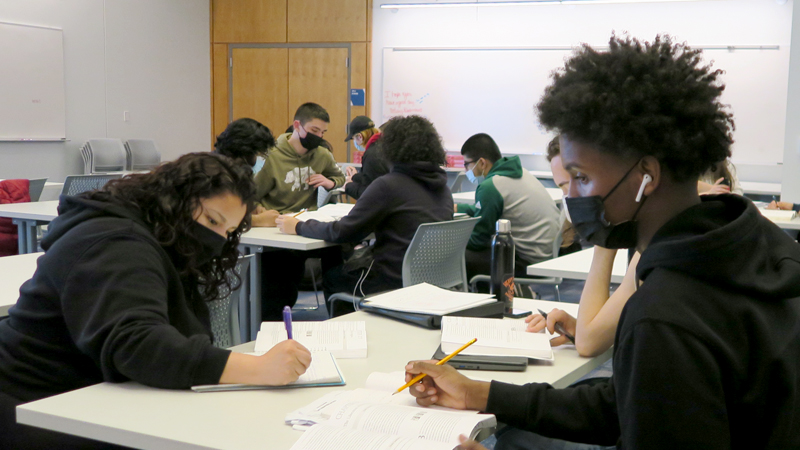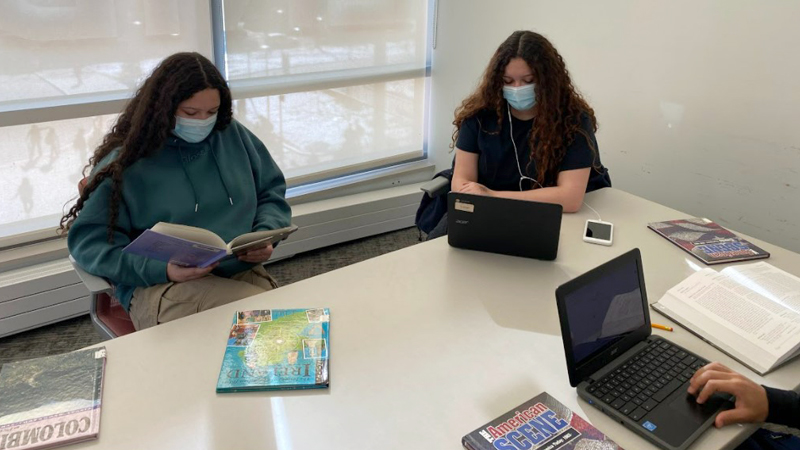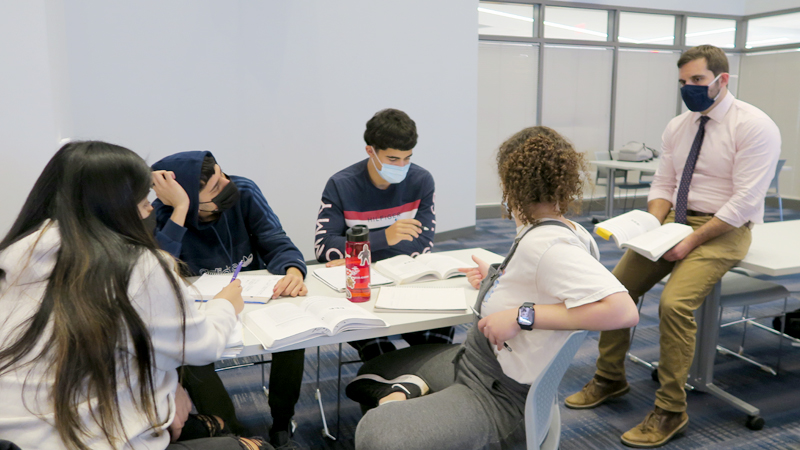Somerville High School students gain a personal perspective on American History
“The aim of the class was to increase student engagement by bridging the gap between national historical narratives and the community narratives that were the fabric of students’ lives.” –Somerville High School History Teacher David DiPietro1
History teacher Mr. David DiPietro teaches a year-long course called “American Identities” to Somerville High School seniors. It is a dual-enrollment course offered by Somerville High School and the American Studies Department at University of Massachusetts in Boston, and students receive college credit for their work. The course asks students “What is an American?” To answer this question, students use their own families as a case study.
A College Course at Somerville High School
American Identities is organized around reading assignments. Students come to class ready to discuss texts through a technique called “barn raising.” By learning to frame discussion questions and then pose those questions to peers, students create a productive and non-confrontational space for collaboration and ideas-generation and avoid the pitfalls of a debate-style conversation. Mr. DiPietro acts as note taker during these student-led discussions. After each unit, students use their new knowledge to write coherent arguments in essay format.

During a recent class, Mr. DiPietro started the discussion by asking "What is Feminism? What is a Feminist?" Three students answered, each one with a slightly different definition. Students then read through the National Organization for Women's Bill of Rights, published in 1967. They broke into small discussion groups and analyzed each Right. They categorized the Rights as either social/cultural or political/economic. Students from each group chose one important issue and put it under a category on the whiteboard. Mr. DiPietro called on students to explain their reasoning. The discussion that followed was respectful and sophisticated, reflecting both the personal observations of students as well as their own cultural backgrounds. Among the Rights under discussion was whether women and girls have equal access to educational opportunities. One student pointed out that educational access may be fairly equal right now, but then he took the question one step further and wondered whether equal access to education had translated into equal representation in the job force. Mr. DiPietro encouraged the student's discussion group to use their phones to do an immediate web search for statistics that answer that question.

Students Learn How History Relates to Their Own Families
During the second semester, students begin work on their Family History Project. The project is a three-generation family history from 1945 to the present2 in a 25-page paper,. It requires extensive research, interviews, and sophisticated academic writing and historical analysis skills developed during the course. Students become family historians and critical scholars. They establish a timeline of personal family history and a parallel timeline of historical events that influenced their family members. Students analyze their own family members as historical actors and examine how a family member’s personal goals intersected with the social, political, and cultural narratives of the time period the person lived through. Mr. DiPietro writes that “the objective of this project is for students to understand how both personal choices and outside factors influence people’s lives.”3

Research and Library Skills
The History Department course is in its fifth year of collaboration with the Somerville High School Library for this project. Mr. DiPietro says, “I have been very fortunate to have a wonderful research librarian who has come into class and taught students how to access our library databases and how to discern appropriate sources from inappropriate sources.”4 Somerville High Librarian Ms. Kathleen Ross presents a whole class lesson on research instruction tailored to the Family History project and follow-up one-on-one sessions with students throughout the project timeline. The library-classroom collaboration introduces students to advanced academic research tools and strategies. Goals include teaching them to tailor database results to fit their needs, access scholarly and academic journals, use integrated citation tools and interpret information to fit the needs of their project. Their research in the library is where students fill large knowledge gaps about cultural and historical events relevant to their interviewee’s experiences and decision-making processes.
The American Identities course connects the stories of students’ families to American History, giving students a richer understanding of their own place in the world and the way that history affects individual experiences. Skills learned in the class prepare students for the rigors of college through productive group discussion, intensive research, and sophisticated synthesis of information.

For a comprehensive understanding of the American Identities course at Somerville High School, please read the excellent chapter authored by David DiPietro called “Mister, How Come We Never Learned This? Teaching American Studies in a High School Setting,” in the American Studies textbook Teaching American Studies in a High School Setting: State of the Classroom as State of the Field.
R. Ronen, Communications Specialist

